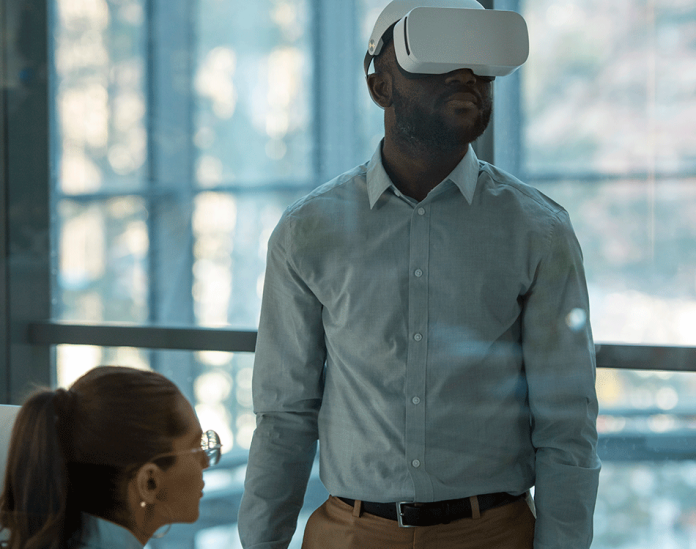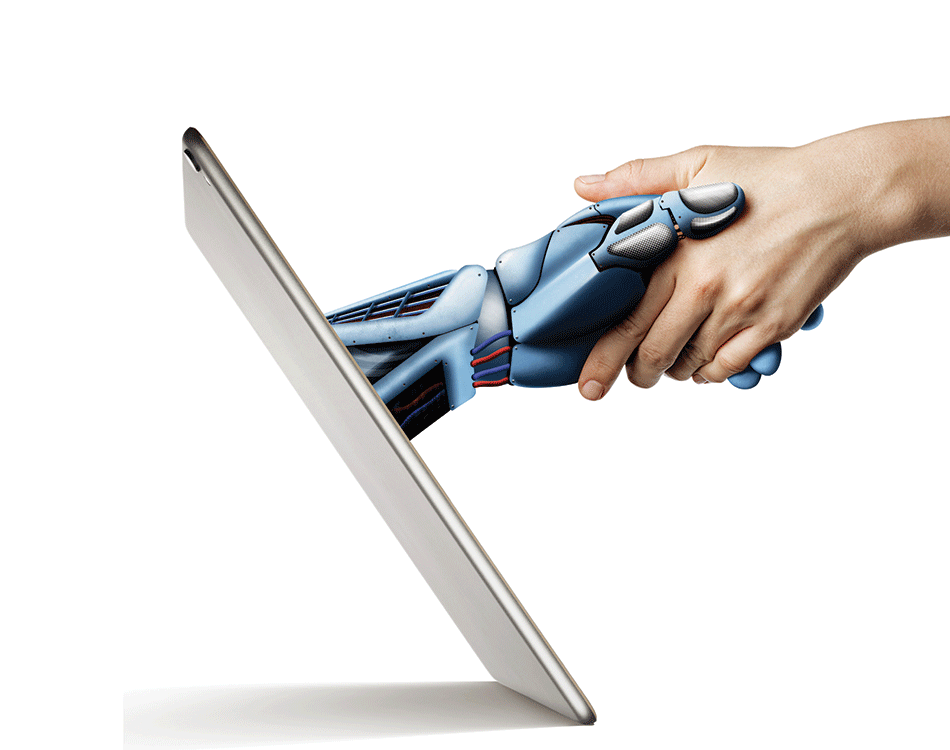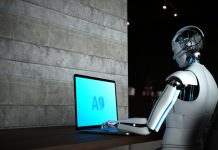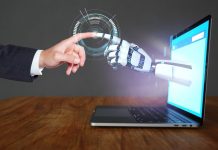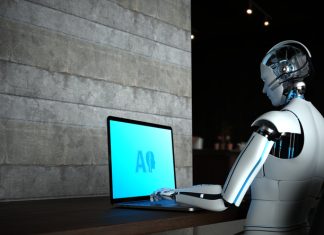The evolution of AI and its quick adoption by organisations has predisposed many workers to the fear of losing their jobs to the technology. This fear might be largely unfounded.
Are you afraid of losing your job to generative AI? The debate rages since digital citizens are rushing to use generative AI software like MidJourney or ChatGPT. Yuval Noah Harari,1 famous historian and author of popular books Sapiens and Homo Deus, recently voiced his concern that while generative AI is a game changer, the technology can develop its own content and ideas, build its own social culture, and replace an entire part of our abstract production. The media has jumped on it and CNBC recently ran a catchy headline claiming that “Thirty-seven percent of workers between the ages of 18 and 24 are worried about new technology eliminating their jobs”.2 The BBC also had its own contribution with the headline “AI anxiety: The workers who fear losing their jobs to artificial intelligence”.3
Anxiety might be present, but the disturbing truth is that media is building the anxiety, rather than developing a sound perspective on the relationship between jobs and AI.
Looking backward
Looking back on how major tech innovations played out, fear around how technology can deconstruct work/knowledge has always been present. In the Middle Ages, as reported by Le Point,4 a Benedictine monk, Johannes Trithemius, defended the work of copying texts by his peers, because the slowness of the work was synonymous with a process of contemplation and profound discovery of the contents. He opined that the printing of books was not only toxic but would trivialise and weaken learning and culture. Even much later, renowned economists, from John Stuart Mill to David Ricardo, were suspicious of the idea that technology may build jobs. John Maynard Keynes5 further coined, in 1931, the term “technological unemployment” in his essay named Economic Possibilities for Our Grandchildren, in which he predicted that due to technology diffusion, the “most pressing problem in the developed economies would be how to fill our leisure time.”
Well, we still have jobs today despite Keynes´s prediction—and the academic literature has proven with a large set of studies6 that new jobs could be created in the wake of multiple technological developments.
Looking forward
The key question is whether this time can be different.7 Technologies are becoming, no doubt, more powerful, and their economic scope getting larger by the day. But three important facts are usually not taken into account by techno-pessimists.
1. Technology is as much about augmentation than a substitute to jobs.
Let´s provide a few examples regarding generative AI. Consider first how Reuters and Associated Press have experimented with AI-generated news articles for tasks like financial reporting and sports recaps. Artists and designers also can leverage generative AI tools to enhance their creative process. For instance, Adobe’s Project Scribbler uses AI to transform rough sketches into polished artwork, providing inspiration and saving time. A few years back, musician and composer Holly Herndon8 released a music album, relying on an AI system trained on Herndon’s own voice and musical style. For the musician, AI complemented her exploration of new musical possibilities and pushed the boundaries of traditional composition for her own benefits instead of separating the tasks between production and performance.
Another example where generative AI has built new inroads is coding. GitHub Copilot is an AI-powered code completion tool developed to generate code suggestions and snippets based on the context and programming language being used. While this has replaced some tasks of coders, programmers are using their freed up time to do more added-value tasks; productivity follows and more jobs, no less, are being driven to complex software tasks. Finally, AI works on data, and the critical issue for many companies is not about data processing but data generation. What generative AI is good at is building synthetic data.9 Those synthetic data modelled on real data may help provide enough data for more powerful analysis, justifying the jobs of data analysts — (while providing a layer of privacy as real user data is not being utilised to power models).
2. Technology is less often used for efficiency than for higher quality and stronger innovation — and great innovation expands output and employment.
Quality is often the result of technology, and in the long term, builds wealth. Grammarly’s users, a popular AI writing assistant tool have reported a 76% increase in writing accuracy. Google Translate has improved translation quality by 60%, making it more accessible for users globally. Among marketers using generative AI, half of them report that the most important benefit is a faster creative output cycle and better creative design.
Innovation is another by-product of AI. A case in point is BioNTech, a biotechnology company that used Generative AI and machine learning techniques during the drug discovery process and developed a COVID-19 vaccine in no time. With these innovations, BioNTech expanded its workforce not by 20%, not even by 100%. In fact, its employment went 4-fold in just three years. Adobe a leading software company has integrated generative AI capabilities into its software products, such as Adobe Photoshop, Illustrator, and Premiere Pro, expanding customer support and training teams to assist users in leveraging these new capabilities effectively. Employment grew especially in areas of trainers and documentation specialists who focus on supporting and educating customers on using generative AI features.
3. Technology and employment are not only to be checked at the firm level but at the entire ecosystem.
The type of catchy media titles we see today about AI and jobs tend to be more about AI and one’s current job. But those articles miss the full macroeconomic effect. A new range of jobs will be created by virtue of technologies and other jobs will be created in the entire ecosystems, not the least as part of the gain in productivity out of technology being reinvested in the economy.
Regarding new jobs, let’s first look at digital. The rise of social media platforms has led to the need for professionals who can manage and enhance a company’s online presence, engage with customers, and create targeted social media strategies. The proliferation of mobile applications has created a demand for skilled app developers who can design, develop, and maintain mobile applications for various platforms. As generative AI becomes more prevalent, AI ethicists will explode as being responsible for examining the ethical implications and societal impact of AI systems.
One other much bigger impact is the fact that technology use often overspills to the entire ecosystem or the economy. In their academic research, Arntz and her colleagues studied the venue of robotics in the German automotive industry. While it killed a few jobs at the start through automation, it made the industry able to compete with the Japanese car exporters, resulting in saving and expanding the automotive industry. The effect was a positive net employment growth out of rapid robotisation. One notable corporate example of such an overspill in ecosystems is how NVIDIA’s GANs have significantly improved the visual quality and realism of computer-generated graphics in video games, creating job opportunities for artists, designers, developers, and animators specialising in creating immersive content. NVIDIA’s GANs have been used to enhance medical imaging and generate synthetic medical data for training and research purposes. The integration of generative AI in healthcare is already increasing the demand for medical imaging specialists, researchers, and professionals with expertise in AI-assisted diagnostics and medical data analysis.

One should think twice as to whether technology kills jobs- it may kill some, but technology has shown ways to build new ones or push new labour demand as a result of major productivity gains reinvested in the economy. Technology brings about creative destruction that is possibly inevitable, but by itself, it does not necessarily paint a picture of a workless future. Maybe, it is time to use generative AI for the good and stop worrying about it.
About the Author
 Dr. Jacques Bughin is the CEO of Machaon Advisory and a professor of Management. He retired from McKinsey as senior partner and director of the McKinsey Global Institute. He advises Antler and Fortino Capital, two major VC/PE firms, and serves on the board of multiple companies.
Dr. Jacques Bughin is the CEO of Machaon Advisory and a professor of Management. He retired from McKinsey as senior partner and director of the McKinsey Global Institute. He advises Antler and Fortino Capital, two major VC/PE firms, and serves on the board of multiple companies.
References
- Yuval Noah Harari. https://www.ynharari.com/.
- These American Workers are the Most Afraid of A.I. Taking Their Jobs. November 07, 2019. CNBC. https://www.cnbc.com/2019/11/07/these-american-workers-are-the-most-afraid-of-ai-taking-their-jobs.html#:~:text=Thirty-seven%20percent%20of%20workers%20between%20the%20ages%20of,highest%20levels%20of%20fear%20about%20technology-caused%20job%20losses.
- AI Anxiety: The Workers Who Fear Losing Their Jobs to Artificial Intelligence. April 19, 2023. BBC. https://www.bbc.com/worklife/article/20230418-ai-anxiety-artificial-intelligence-replace-jobs.
- Intelligence artificielle : le choc des cerveaux. May 11, 2023. Le Point. https://www.lepoint.fr/sciences-nature/intelligence-artificielle-le-debat-choc-et-inedit-harari-le-cun-11-05-2023-2519779_1924.php#11 https://www.lepoint.fr/sciences-nature/intelligence-artificielle-le-debat-choc-et-inedit-harari-le-cun-11-05-2023-2519779_1924.php#11.
- Economic Possibilities for Our Grandchildren. 2010. Essays in Persuasion. https://link.springer.com/chapter/10.1007/978-1-349-59072-8_25/.
- Technology and Jobs. November 24, 2009. Economics of Innovation and New Technology. https://www.tandfonline.com/doi/abs/10.1080/10438590802469552https://www.tandfonline.com/doi/abs/10.1080/10438590802469552.
- Is This Time Different? How Digitalisation Influence Job Creation and Destruction. 2019. Research Policy. https://orbilu.uni.lu/bitstream/10993/39183/1/Balsmeier_Woerter_Is%20this%20time%20different%20-%20RP%20-%202019_pub.pdf.
- Holly Herndon: The Musician Who Birthed an AI Baby. May 02, 2019. The Guardian. https://www.theguardian.com/music/2019/may/02/holly-herndon-on-her-musical-baby-spawn-i-wanted-to-find-a-new-sound.
- What is Synthetic Data? N.d. MOSTLY AI. https://mostly.ai/synthetic-data/what-is-synthetic-data.


